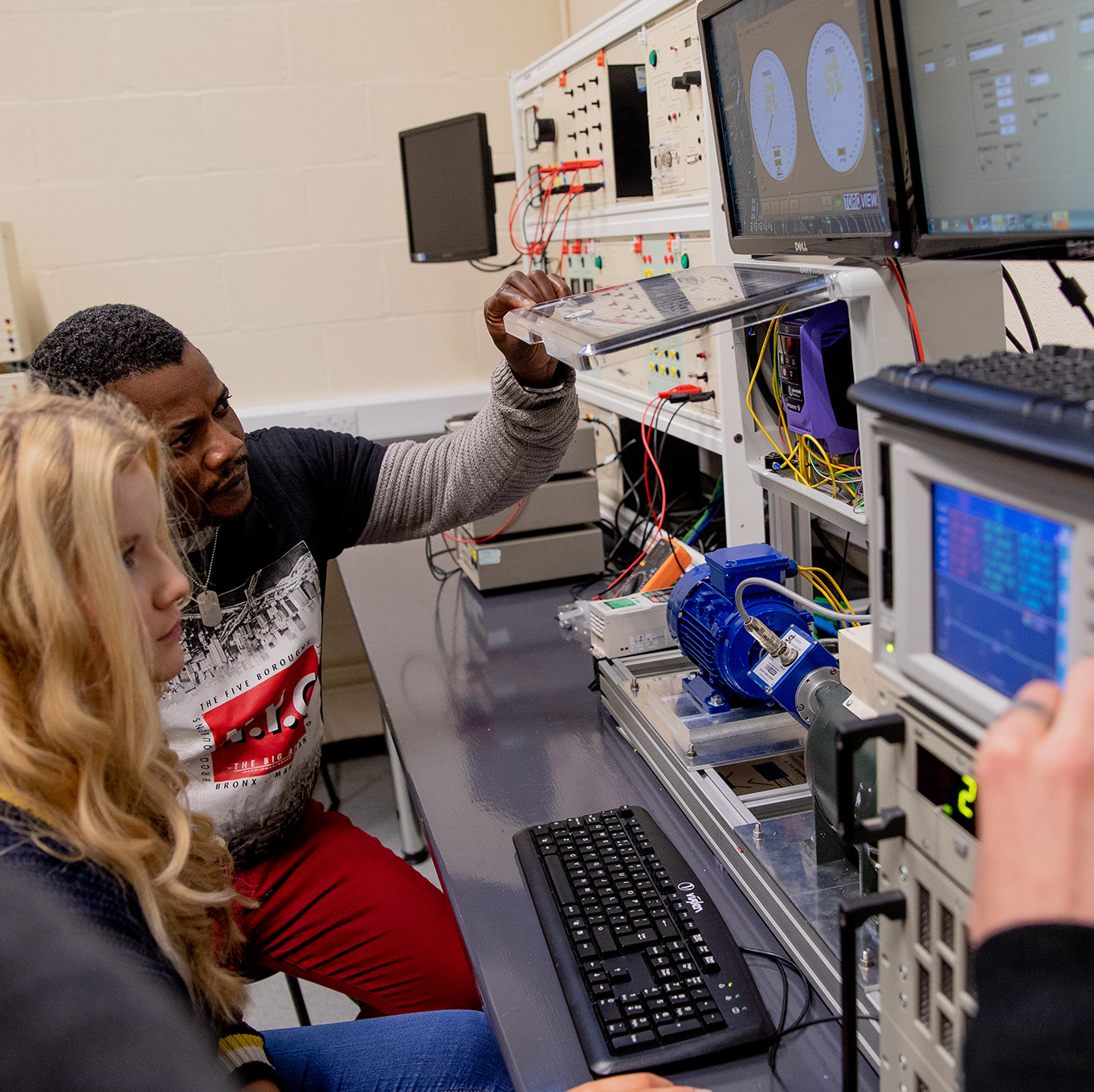BEng (Hons) Electrical & Electronic Engineering

Course details
UCAS Code
H600
Year of entry
2025, 2026
Duration
3 YRS (FT)
UCAS Tariff
96-112
Institution Code
G53
Location
Wrexham
Course Highlights
Access
to a dedicated maths support centre
Top 10
in the UK for Student Voice*
Accreditation
from the Institution of Engineering and Technology

Engineering atWrexham University
Thinking of a career in Engineering? Hear from lecturers and students about our Engineering degrees at Wrexham University.
Why choose this course?
From transport and renewable energy to aerospace and robotics, our Electrical and Electronic degree will position you at the forefront of new and emerging technologies in the engineering field. Accredited by the Engineering Council, this course is designed to equip you with the skills and knowledge that top employers demand in this industry.
You will:
- Receive accreditation from the Institution of Engineering and Technology (IET), helping to improve your employability prospects.
- Use industry-standard software packages, allowing you to develop practical skills that are sought-after by industry leaders.
- Have access to a dedicated maths support centre should you need it.
- Benefit from strong links with local and national industry experts, providing you with opportunities to attend site visits and gain real-world insights.
*Our Engineering subject area is ranked Top 10 in the UK for Student Voice, Assessment and Feedback, and Learning Resources (National Student Survey 2024)
*Our Engineering subject area is ranked Joint 3rd out of Wales, Scotland, and Northern Ireland for Overall Satisfaction. (National Student Survey 2024)
This course is also available with a foundation year BEng (Hons) Electrical & Electronic Engineering (with foundation year) UCAS Code: H603
Key course features
- The course focuses on specialisms within Power, Electronics, Instrumentation and Control.
- You will gain practical experience in our electronic design and testing labs, power electronics labs, programmable logic controllers (PLC) labs and computer-aided design (CAD) labs.
- You will explore the software packages of Arduino, Raspberry Pi, MATLAB and Simulink, Multisim and Ultiboard.
- This course aims to develop your critical skills: you will build your analytical, computational, and design capabilities, as well as transferable skills to boost your employability prospects.
- The course will provide you with an understanding of social, environmental, and ethical implications impacting the industry.
What you will study
YEAR 1 (LEVEL 4)
MODULES
- Engineering Mathematics: Gain the essential maths skills you’ll need to solve real-world engineering problems, from working with algebra and calculus to applying key formulas used in electrical, and mechanical.
- Introduction to Electrical & Mechanical Engineering Science: Explore the fundamentals of electrical and mechanical engineering by learning how to analyse circuits and calculate forces, stresses, and strains, while gaining hands-on experience with real world measurement techniques.
- CAD and Production Science: Learn how to create and interpret technical drawings using industry standard CAD software, and explore how materials, manufacturing processes, and quality control shape the design and production of real-world engineering components.
- Engineering Professional Development: Develop the essential skills and confidence to thrive in the engineering world by learning how to communicate professionally, manage projects, and reflect on your growth as an engineer.
- Problem Solving with Programming: Learn to think like a programmer by breaking down problems, writing clear code, and building practical solutions using real world programming tools and techniques.
- Analogue & Digital Electronics: Gain hands on experience with the building blocks of modern electronics by learning how to design and analyse analogue and digital circuits, from transistors and op-amps to logic gates and number systems.
YEAR 2 (LEVEL 5)
MODULES
- Further Engineering Mathematics: Build your confidence in tackling complex engineering problems by mastering advanced mathematical tools like partial differentiation, Fourier series, and Laplace transforms, while learning to analyse data and model systems using industry standard software
- Engineering Futures – Research, Ethics and Sustainability: Develop your research skills while exploring how ethics, sustainability, and professional standards shape the future of engineering and your role within it.
- Intelligent Control System Design: Explore how to design, analyse, and enhance control systems using tools like MATLAB and Simulink, applying both traditional PID controllers and modern AI driven techniques such as reinforcement learning and model predictive control to real-world challenges like robotics and autonomous vehicles.
- Electrical Power Engineering: Gain practical experience in designing, analysing, and maintaining electrical power systems including generation, transmission, and distribution while learning how to optimise performance and minimise environmental impact using real-world tools and techniques.
- Industrial Automations & PLCs: Gain practical skills in designing and programming automated systems using programmable logic controllers (PLCs), preparing you to optimise industrial processes and enhance operational efficiency.
- Embedded Systems: Explore how to design and program embedded systems by learning to integrate hardware and software components, enabling you to create smart devices and control systems used in everyday technology.
YEAR 3 (LEVEL 6)
MODULES
- Project: Take on your own engineering challenge by researching, designing, and delivering a project from start to finish developing real world problem solving, project management, and communication skills that prepare you for your future career.
- Professional Engineering: Develop the professional mindset and practical skills needed to thrive in engineering by tackling real-world scenarios involving ethics, teamwork, health and safety, and legal responsibilities.
- Electronic Design and Testing: Gain hands on experience in designing, building, and testing electronic circuits by applying engineering principles and simulation tools to create reliable, real-world solutions.
- Digital Signal Processing: Learn how to analyse and process digital signals using tools like MATLAB, mastering techniques such as Fourier transforms and filter design to solve real world engineering problems.
- Power Electronics and Electrical Machines: Gain hands on experience in designing, analysing, and maintaining power electronic converters and electrical machines, equipping you with the skills to optimise performance, efficiency, and reliability in real-world energy systems.
The information listed in this section is an overview of the academic content of the programme that will take the form of either core or option modules. Modules are designated as core or option in accordance with professional body requirements and internal academic framework review, so may be subject to change.
Entry requirements & applying
The academic requirements for the course are 96-112 UCAS tariff points at GCE A-level or equivalent, including Maths or Physics.
Teaching & Assessment
A broad range of assessment methods are used; these include phase tests, written assignments, practical work on computers, a portfolio of work, logbooks, presentations and laboratory work case studies and CAD. A combination of this work may form part of your assessment, alongside time-constrained exams. Each module is assessed by a variety of methods, enabling students to display their full potential. A project dissertation will form one of the final parts of your assessment.
TEACHING AND LEARNING
Teaching methods include lectures, laboratory sessions, student-led seminars and guided research.
Independent learning is an important aspect of all modules, as it enables students to develop both their subject-specific and key skills. Independent learning is promoted through guided study and feedback given to students.
Wrexham University is committed to supporting our students to maximise their academic potential.
We offer workshops and support sessions in areas such as academic writing, effective note-making and preparing for assignments. Students can book appointments with academic skills tutors dedicated to helping deal with the practicalities of university work. Our student support section has more information on the help available.
In terms of particular needs, the University’s Inclusion Services can provide appropriate guidance and support should any students require reasonable adjustments to be made because of a recognised prevailing disability, medical condition, or specific learning difference.
Career prospects
Our Careers & Employability service is here to help you make decisions and plan the next steps towards a bright future. From finding work or further study to working out your interests, skills and aspirations, they can provide you with the expert information, advice and guidance you need.
The course equips you with a thorough knowledge and skills in engineering at the forefront of new and emerging technologies. Graduates will be well placed to become subject specialists within the industry or to pursue research careers within academia.
There is a recognised shortage of qualified electrical/electronic engineers in the UK. A qualification in the field will make you instantly attractive to employers as a result. You will have the skills to contribute to the design and development of electronic systems and processes. Employment opportunities exist in the aerospace industry in aircraft instrumentation systems (technician or engineer level) or in the armed forces.
Fees & funding
You do not have to pay your tuition fees upfront.
The fees you pay and the support available will depend on a number of different factors. Full information can be found on our fees & finance pages. You will also find information about what your fees include in the fee FAQs.
All fees are subject to any changes in government policy, view our undergraduate fees.
For international students looking to study this course please see our international fees.
Programme specification
You can see the full programme specification here.Accommodation
At Wrexham University, we offer on-campus en-suite rooms within our Wrexham Student Village. These private, fully furnished spaces are conveniently located, providing easy access to campus facilities, study areas, and social spaces. Plus, you’re just a 10-minute walk from the city centre!
With all bills included, free Wi-Fi, 24/7 security, and large social areas, you’ll find everything you need for a great student experience.
Explore our student accommodation options to find your perfect home away from home.
Subject to re-accreditation
External accreditation/recognition by Professional, Statutory and Regulatory Bodies (PSRBs) has to be renewed periodically for existing courses. The details on the website are based on the accreditation of the previous or current version of the course, and the anticipated updates are made as soon as they are known. The majority of courses that are still ‘subject to re-accreditation’ are approved as expected however, this is not guaranteed and should the accreditation not be approved as planned, or be significantly amended or delayed, you will be informed by the University.
International
This course is open to international students, for information about the university’s entry requirements for EU/international students, please visit our international section.